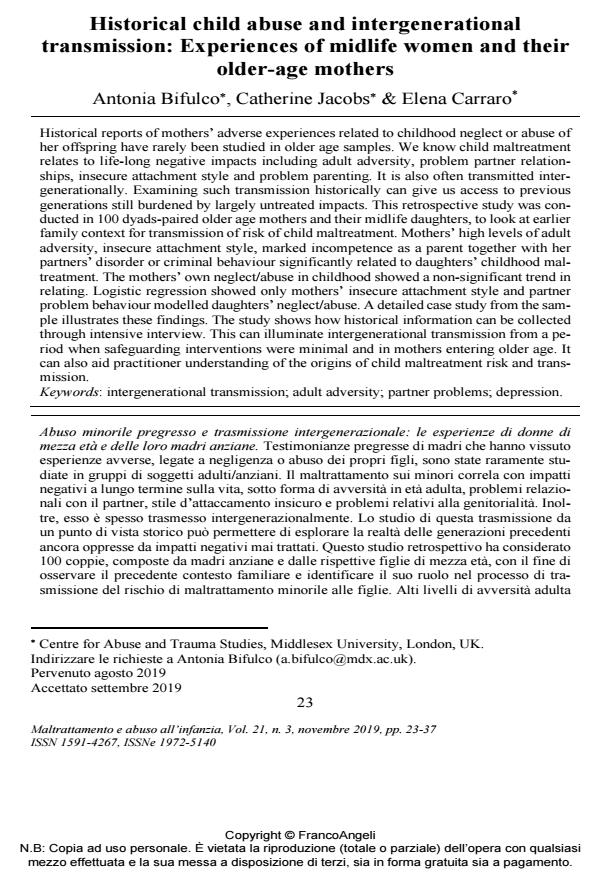Historical child abuse and intergenerational transmission: Experiences of midlife women and their older-age mothers
Journal title MALTRATTAMENTO E ABUSO ALL’INFANZIA
Author/s Antonia Bifulco, Catherine Jacobs, Elena Carraro
Publishing Year 2019 Issue 2019/3
Language English Pages 15 P. 23-37 File size 319 KB
DOI 10.3280/MAL2019-003003
DOI is like a bar code for intellectual property: to have more infomation
click here
Below, you can see the article first page
If you want to buy this article in PDF format, you can do it, following the instructions to buy download credits

FrancoAngeli is member of Publishers International Linking Association, Inc (PILA), a not-for-profit association which run the CrossRef service enabling links to and from online scholarly content.
Historical reports of mothers’ adverse experiences related to childhood neglect or abuse of her offspring have rarely been studied in older age samples. We know child maltreatment relates to life-long negative impacts including adult adversity, problem partner relationships, insecure attachment style and problem parenting. It is also often transmitted inter-generationally. Examining such transmission historically can give us access to previous generations still burdened by largely untreated impacts. This retrospective study was conducted in 100 dyads-paired older age mothers and their midlife daughters, to look at earlier family context for transmission of risk of child maltreatment. Mothers’ high levels of adult adversity, insecure attachment style, marked incompetence as a parent together with her partners’ disorder or criminal behaviour significantly related to daughters’ childhood maltreatment. The mothers’ own neglect/abuse in childhood showed a non-significant trend in relating. Logistic regression showed only mothers’ insecure attachment style and partner problem behaviour modelled daughters’ neglect/abuse. A detailed case study from the sample illustrates these findings. The study shows how historical information can be collected through intensive interview. This can illuminate intergenerational transmission from a period when safeguarding interventions were minimal and in mothers entering older age. It can also aid practitioner understanding of the origins of child maltreatment risk and transmission.
Keywords: Intergenerational transmission; adult adversity; partner problems; depression.
Antonia Bifulco, Catherine Jacobs, Elena Carraro, Historical child abuse and intergenerational transmission: Experiences of midlife women and their older-age mothers in "MALTRATTAMENTO E ABUSO ALL’INFANZIA" 3/2019, pp 23-37, DOI: 10.3280/MAL2019-003003